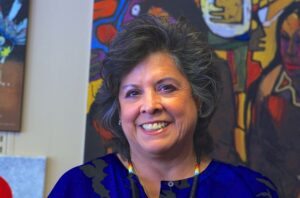Lakehead University to deliver five-part Truth and Reconciliation virtual series

By Rick Garrick
ORILLIA — Lakehead University is aiming to engage the community in a micro conversation during its five-part Truth and Reconciliation Community Dialogues series featuring Indigenous Elders and Knowledge Keepers and activists and allies. The Truth and Reconciliation Community Dialogues will be held on Tuesday evenings at 7 p.m. on the Zoom virtual platform from March 1-29.
“People keep asking what can we do,” says Cynthia Wesley-Esquimaux, chair for truth and reconciliation at Lakehead University, one of the Truth and Reconciliation Community Dialogues speakers, and a Chippewas of Georgina Island citizen. “They still don’t know a lot about the history of this country and Indigenous peoples, so we thought we would bring some people together to give them an understanding of that. For instance, Brian Charles is going to talk about the wampum belt and do a whole display on what that’s about so people have a better sense of the kinds of conversations that were being had while the treaties were being negotiated, at least on this side of the country.”
Charles, a Chippewas of Georgina Island citizen, will deliver the third session on March 15 with an introduction by Chippewas of Rama First Nation Chief Ted Williams.
“We have Lenore Keeshig talking about story and why story is an important part of it because everything we’ve done in the concert of reconciliation has been about story and people sharing their life experiences as they were growing up or as Residential School Survivors or as people who live on reserves,” Wesley-Esquimaux says.
Keeshig, a Neyaashiinigmiing citizen, will deliver the second session on March 8 with an introduction by Moira McPherson, president and vice-chancellor at Lakehead University.
“I’m going to talk about micro reconciliation, that you don’t have to worry about changing the entire face of Canada,” Wesley-Esquimaux says. “It’s quite alright for you to change the understanding of your own family, your own community and your own church, the places where you go on a regular basis and do small circles so people have a better sense of having a conversation about a book or whatever. I’m going to talk about those kind of things and why we’re even talking about reconciliation at all.”
Wesley-Esquimaux will deliver the fourth session on March 22 with an introduction by Chippewas of Georgina Island First Nation Chief Donna Big Canoe. Eli Baxter, a Marten Falls citizen, will deliver the first session on March 1 with an introduction by Senator Gwen Boniface.
“Eli’s a very good speaker, he is interesting and he has experience with Residential Schools,” Wesley-Esquimaux says. “We thought it was a good way to open the conversation, that’s why we started having the conversation in the first place, that’s what the Truth and Reconciliation Commission was all about.”
The Activists and Allies Panel session on March 29 will feature Mike DeGagné, CEO at Indspire; Karen Kun, founder and president at Waterlution; Ry Moran, associate university librarian – Reconciliation at the University of Victoria; and Tracee Smith, CEO and producer at Outside Looking In and Missanabie Cree citizen with an introduction by Orillia Mayor Steve Clarke.
“Reconciliation is not only about you and I getting along or you and I knowing more about each other, it’s also about the larger issues like environment and how we get people to understand everything we do has an impact, whether it’s an impact on another person or an impact on the larger world in which we live, that we have to start to understand that we have to take responsibility,” Wesley-Esquimaux says.
Information about the Truth and Reconciliation Community Dialogues is posted online.


